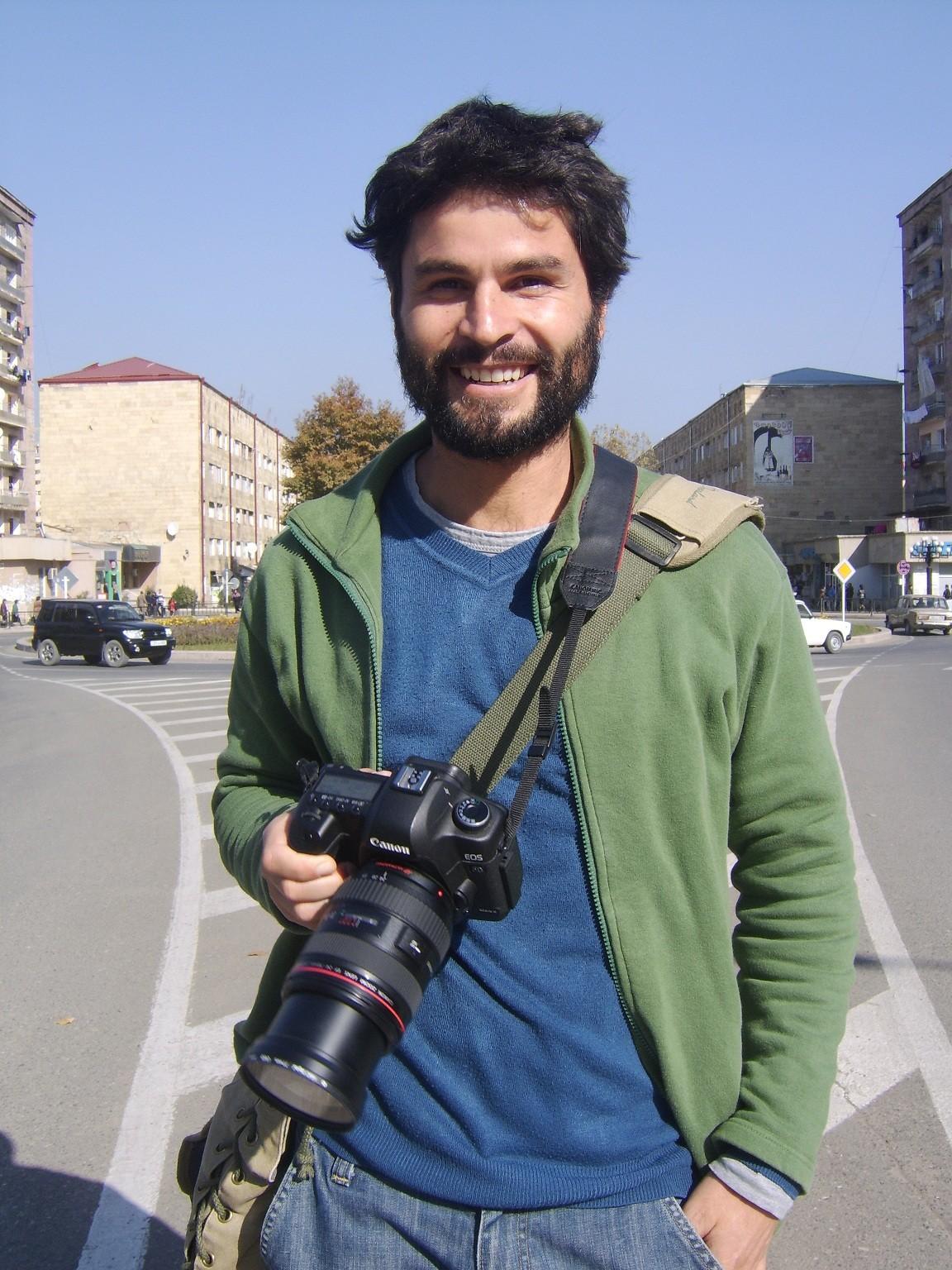
Italian Photo Journalist Falls in Love with Artsakh
“I want to create a new image for the country and its people”
It was in a coffee shop in Stepanakert that Italian photo-journalist Francesco Alesi told me about his visit to Artsakh.
“I was eating pizza in Italy with my girlfriend Natalie. She told me about her visit to Armenia and Artsakh during the fall of last year. I had no idea she was of Armenian extraction since she was born and raised in France. She asked why I haven’t travelled to Armenia yet, and from there to Artsakh. I was stuck for an answer. Artsakh, or the name Karabakh, meant nothing to me,” Francesco recounts.
He says that up till then, he had heard nothing about Artsakh and hadn’t come across it on the web. Natalie’s challenge intrigued Francesco and he set about searching the web for more information about Artsakh. He gathered a slew of information in English and says that from 2005, all of it was about the unfinished war.
“Nevertheless, I decided to go to Artsakh. But I had a fear deep down inside about going to a dangerous country where shots were fired and people lived in fear as well,” he says.
He was pleasantly surprised when he reached Stepanakert. The sights that greeted him were quite different from what he had read on the web.
“I realized that all the talk about Artsakh being a dangerous place didn’t jive with reality. Don’t ask me where such an atmosphere exists in Artsakh, because I didn’t see it. The people there don’t give much credence to the warmongering statements of politicians, and that’s why I grew to love them so much. Like everywhere else, people in Artsakh go to the market, make shoes, get married and have kids. They enjoy the ups and downs of life,” Francesco says.
Listening to Francesco, I got the impression he doesn’t believe that Azerbaijani and Armenian political leaders are doing all they can to quickly settle the conflict. Constant talk of the “enemy” and the “conflict” merely serves to sow the seeds of enmity in the people.
“I understand that it’s difficult for that generation, who even has a hazy memory of the war years, to enter into dialogue with the other side. If the leaders of the two countries truly want peace, I would suggest they set up a school where the children of both sides can play together. Believe me, the kids would love this. It’s only the parents that are opposed to such a thing.”
Francesco believes that the press also must share part of the blame for the current situation for reporting the bellicose statements being made, rather than covering the news about how young people are trying to foster dialogue through social chat networks and other means.
The Italian photo-journalist is preparing reportage from the front lines where military skirmishes have occurred.
“Seeing a different picture here, a new idea came to mind and I decided to prepare some ‘de facto’ reportage about the country and its people that are not ‘de jure’ recognized. In any event, not being officially recognized does not prevent the people from leading a normal life like anywhere else in the world.”
Francesco hopes that people who haven’t been to Artsakh will be able to form a picture of what life is like there through his photo reportage.
This de-facto photo reportage focuses in on the present life of the people, while at the same time, not overlooking the war and history that lead up to it.
The aim of a photo journalist is to portray the optimistic daily life of the people of Artsakh in balance with the ever present issue of the unsettled conflict and all its negative connotations.
Francesco confesses that even though he is a photo journalist by profession and that he came to Artsakh in that capacity, he often wonders if the camera can adequately capture all there is to be reported on.
Thus, he began to think about making a documentary film in Artsakh.
“Since I have always been intrigued by ordinary people and their lives, I decided to make a film about Narek, a man who has lost both legs but remains an optimist and active. His determination and love of life really impressed me. I told the story to an Italian film production studio and they were interested. I have already shot some footage and will take it with me to Italy. My next film will be about the women who sell sunflower seeds. But I haven’t approached any of them yet.”
Francesco hopes to return to Artsakh come next summer and turn these two projects into reality.
In the short space of six weeks, Francesco fell in love with Artsakh and its residents. He was amazed by the strong family bonds that exist and the way people help each other out.
What he couldn’t cope with was the uniformity he witnessed – in language, dress, meals, and culture.
“When I walk down a street in Italy, I am used to hearing any number of languages, seeing people dressed differently, and the option of eating a wide range of foods. I saw none of that in Artsakh and it was tough.”
Despite it all, Francesco says he’ll be returning to his native Italy with fond memories of Artsakh and the good friends he made while there.
 Videos
Videos Photos
Photos




Write a comment